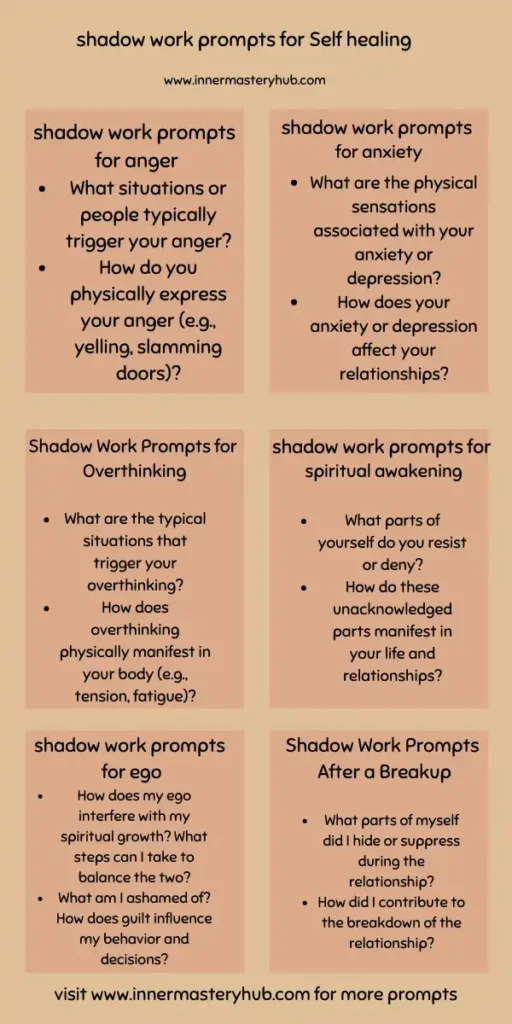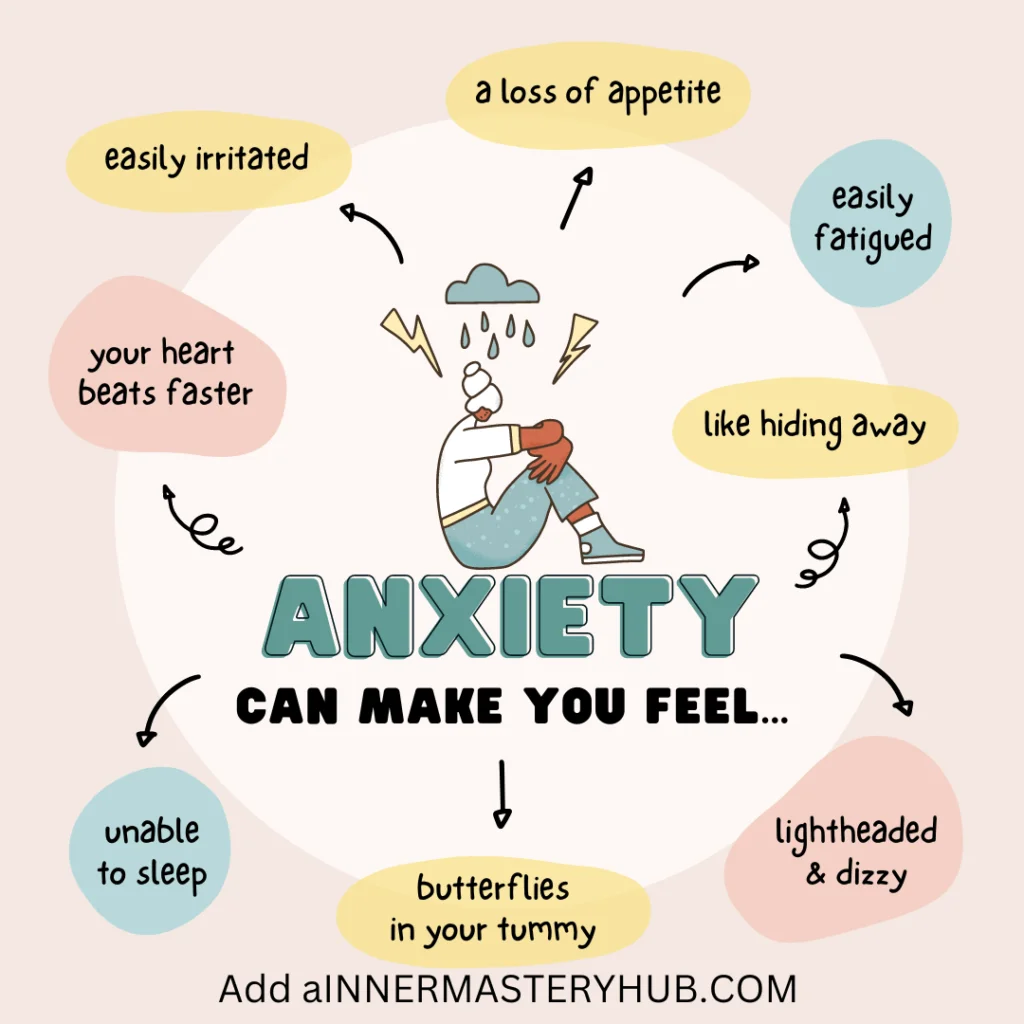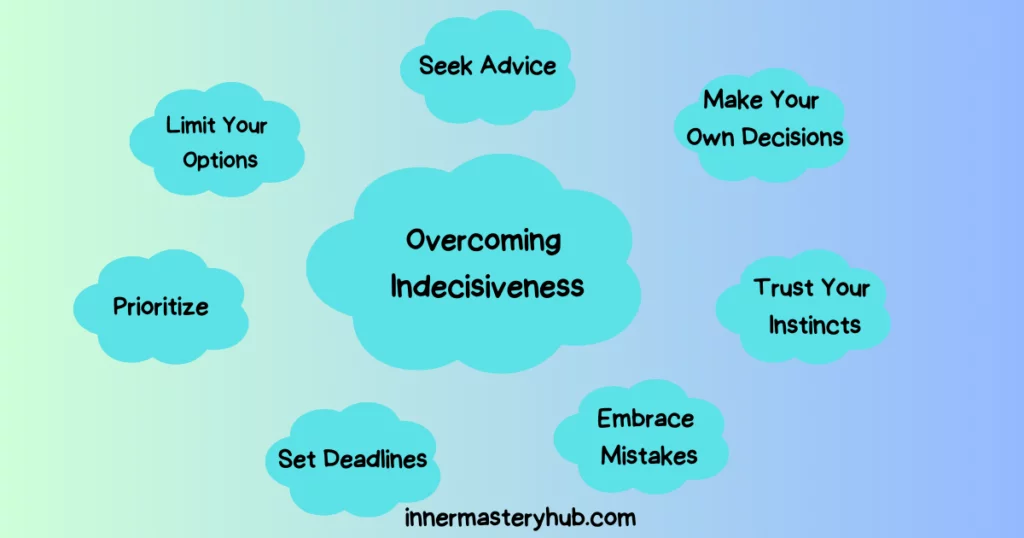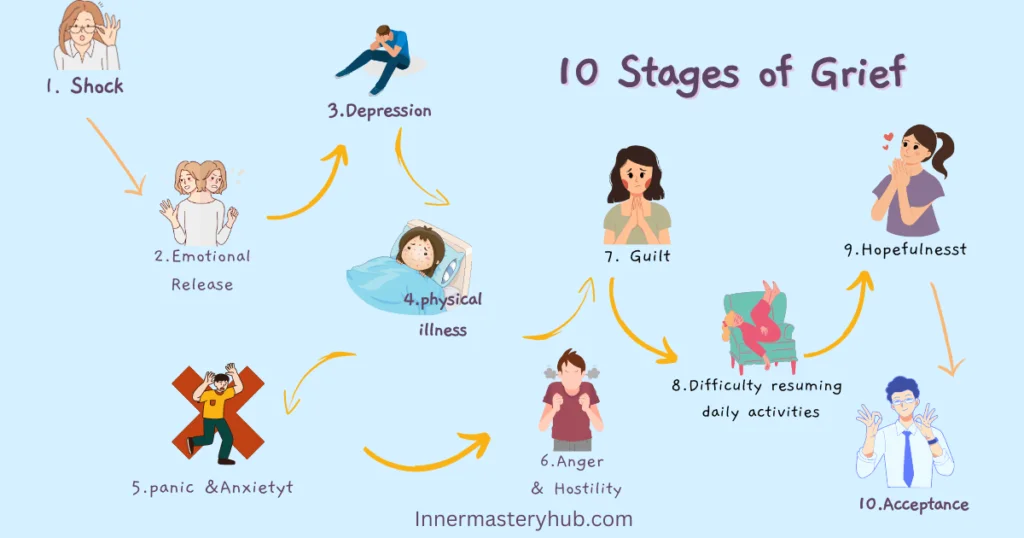
Everybody tries to hide a part of themselves. Our minds are like a secret room where we keep the aspects of ourselves that we dislike. It’s possible that you were told as a child to stop asking questions, which is why your inner child now fears asking questions. Or perhaps a traumatic event occurred, and you have been trying to avoid thinking about it ever since.
Your shadow self is the name given to this hidden aspect. It is comprised of the emotions, memories, or actions that you suppress due to discomfort. Hiding these things can prevent you from being genuinely joyful, even if you may believe you are protecting yourself.
You may experience profound self-realization, self-awareness, or self-discovery as a result of answering shadowwork questions. Let’s talk about how you can grow and heal by revealing this hidden aspect.
Table of Contents
importance of shadow work questions or shadow work prompts
Why Ask Yourself Tough Questions?
The question, “Why should I dig up all this old stuff?” may be on your mind. The thought of looking at your shadow self may be unsettling or even frightening. But believe me, it’s worthwhile.
It is comparable to organizing a closet. To make way for new things, you must get rid of the old items. Statements or questions intended to help you declutter your mind and emotions are known as shadow work prompts.
Realizing your shadow side can lead to significant transformations. Changing your limiting perspective can help you feel better about yourself, heal old wounds, strengthen relationships, and even achieve your goals. It’s similar to taking a burden off your shoulders.
How to do shadow work?
Shadowwork can feel overwhelming, but it doesn’t have to be. Here are some simple steps to get you started:
Journaling. Write down your thoughts and feelings. This can help you uncover hidden emotions and patterns. Don’t worry about making sense of it all at first. Just let it flow.
Meditation and Mindfulness. These practices help you connect with your deep inner self. By calming your mind, you can better observe your thoughts and deep breaths and make you feel your feelings without judgment.
Seek Support. Speaking with a support group, therapist, friend, or mental health specialist can be beneficial. Talking to people about your experiences might give you encouragement and insightful information.
What are shadow work questions?
Questions for healing that you may not like or are scared to admit are called shadow work prompts. You can better understand who you are and why you act the way you do by confronting these aspects:
These questions can cover a wide range of topics for exploring your shadow:
- Emotions. What emotions do you frequently suppress?
- Beliefs. What limiting beliefs do you hold about yourself?
- Relationships. How do you contribute to problems in your relationships?
- Past experiences. How have past traumas shaped your current behavior?
- Self-worth. What negative self-talk do you engage in?
Asking these questions may help you explore the root causes of your challenges and begin the process of healing and self-acceptance.
Why you should ask shadow work questions
The shadow is “the unknown dark side of the personality,” according to Carl Jung. It contains the traits we find objectionable, the desires we suppress, and the vulnerabilities we conceal from other people. The shadow is a normal aspect of the human psyche, he said, and it is not always a bad thing.
According to Carl Jung’s idea, if the shadow is not investigated, it might take control of us through our unconscious. Therefore, integrating the shadow into our conscious awareness rather than suppressing it is the aim.
If we do not integrate and forgive the shadow side of our psyche, we will continue to project it onto other people. What we agree upon can be made public!
100+ shadow work questions
Here are my favorite 100 shadow work questions. Use these shadow work prompts to get started for healing and growth.
Shadow work prompts for beginners.
- What are my core values? Do my actions align with them?
- What emotions do I find most difficult to handle?
- In what situations do I feel most insecure or vulnerable?
- How would I describe my ideal self? How do I compare to that?
- What are my biggest fears? How do they hold me back?
- What are some of my negative thought patterns?
- What are my strengths? What are my weaknesses?
- How do I handle criticism or failure?
- What kind of self-talk do I engage in? Is it supportive or critical?
- What do I need to forgive myself for?
- How can I practice self-care and self-compassion?

Shadow work prompts for healing and growth.
- What are the core wounds I carry from childhood?
- In what ways do I sabotage my happiness?
- What emotions do I consistently avoid feeling?
- How do I express anger or frustration in unhealthy ways?
- What are my biggest fears, and how do they hold me back from self-love?
- What limiting beliefs do I hold about myself?
Shadow work prompts for anger.
- What persons or things usually make you angry?
- Do you yell or slam doors as physical manifestations of your anger?
- What emotional effects does your anger have, such as loneliness, shame, or guilt?
- How do your relationships become impacted by your anger?
- Are there certain incidents or recollections that make you angry?
- Which underlying emotions—such as fear, frustration, or sadness—are frequently concealed by your anger?
- Is anger a strength or a weakness in your opinion? For what reason?
- What do you think about other people’s anger?
- What would happen if you permitted yourself to be angry but did nothing about it?
- How can you turn your rage into constructive activity, like working out or finding creative outlets?
- What would it look like to be forceful instead of aggressive when you were angry?
- How can you live a life that is more patient and understanding?
Shadow work prompts for anxiety and depression.
- In what ways does your anxiety or sadness manifest physically?
- How do your relationships become impacted by your sadness or anxiety?
- What ideas or convictions fuel your symptoms of depression or anxiety?
- What are your healthy and harmful coping strategies for sadness or anxiety?
- Has your anxiety or depression been exacerbated by any particular incidents or traumas?
- What do you think about rejection or failure?
- Which fundamental ideas about the world and yourself do you hold?
- How do you respond to criticism or unfavorable comments?
- What worries you? What is the worst that might occur?
- How may your negative thought habits be challenged?
- What actions can you take to boost your self-esteem and confidence?
- How can you forgive yourself and be more self-compassionate?
- What are your hobbies and passions?
- How might your mental and physical health be supported?
- How would you describe your ideal life?
Shadow Work Prompts for Overthinking
Overthinking can be a mental prison. These prompts can help you understand the root of your overthinking patterns and find ways to break free.
- What kinds of scenarios usually cause you to overthink things?
- How does overthinking affect your physical health, such as causing stress or exhaustion?
- How can overthinking affect one’s emotions, such as loneliness, fear, or anxiety?
- How do your everyday life and relationships suffer as a result of overthinking?
- Has your tendency to overthink things been influenced by any particular experiences or events?
- What are the fundamental ideas or anxieties that drive your excessive thinking?
- What is your opinion on ambiguity or uncertainty?
- How much does your overthinking stem from your perfectionism?
- How would you feel if you trusted your gut more than your brain?
- How do you combat your pessimistic mind patterns?
- What kinds of activities support your ability to stay grounded in the here and now?
- How can you develop acceptance and compassion for yourself?
Shadowwork prompts for spiritual awakening.
- What parts of yourself do you resist or deny?
- How do these unacknowledged parts manifest in your life and relationships?
- What fears or insecurities are connected to these shadow aspects?
- How do these shadow aspects relate to your spiritual journey?
- How can you embrace these shadow aspects as part of your wholeness?
- What lessons can you learn from these shadow parts?
- How can you integrate these shadow aspects into your spiritual practice?
- How can you use your shadow to serve a higher purpose?
- What are your biggest obstacles to spiritual growth?
- How do your shadow aspects relate to these obstacles?
- What limiting beliefs are holding you back from reaching your full potential?
- How can you overcome these challenges through shadow work?
- What is your deepest understanding of your soul’s purpose?
- How do your shadow aspects relate to your soul’s journey?
- What is your vision for your spiritual path?
- How can you integrate your shadow work into your spiritual practice?
RELATED POSTS
7 Shadow Work Exercises: Hidden Gems
5 Shadow Work Books that Will Shine a Light on Your Inner Self
25 Best Thought-provoking Personal Why Statement Examples
How to Find Yourself: 17 Powerful Ways to Self-Discovery
Shadowwork prompts for ego.
- How does my ego interfere with my spiritual growth? What steps can I take to balance the two?
- What am I ashamed of? How does guilt influence my behavior and decisions?
- Do I tend to feel superior to others? What beliefs or experiences contribute to this?
- How important is external validation to me? What would it mean to find validation within myself?
- When faced with criticism, how do I react? What underlying fears or insecurities drive my defensiveness?
- How do I compare myself to others? What role does envy play in my life?
- How do I compare myself to others? What role does envy play in my life?
- How do I balance confidence with arrogance?
Shadow Work Prompts After a Breakup
- What parts of myself did I hide or suppress during the relationship?
- How did I contribute to the breakdown of the relationship?
- What fears or insecurities did I project onto my partner?
- Are there any negative patterns in my relationships that keep repeating?
- What emotions do I feel that I’m afraid to acknowledge?
- What am I angry about? How can I express that anger safely?
- Am I experiencing feelings of shame or guilt? Where do these come from?
- What do I fear most about being alone?
- What aspects of myself did I lose during the relationship?
- How might my hobbies and passions be rediscovered?
- What must I do to restore my confidence?
- What are my greatest hopes and aspirations for the future?
- What lessons does this breakup teach me?
- In what ways may I use this experience to develop personally?
- What sort of future connection do I hope to build?
- How can I learn to accept and love myself?
Relationship Healing Prompts
- What patterns do I repeat in my relationships?
- How do I contribute to conflict in my relationships?
- What am I afraid of losing in my relationships?
- How can I genuinely show my love and affection?
- What realistic expectations do I have of other people?
- Top presents for your loved ones
Trauma Healing Prompts
What have been the most agonizing events in my life?
How have my current beliefs been influenced by past traumas?
Which unsolved traumas still have an impact on me?
How can I keep from getting harmed again?
For what do I have to forgive myself?
Exploring Your Past
- When did I first experience feelings of inadequacy or unworthiness?
- What impact did my parents or other caregivers have on my sense of self?
- Which loss or tragedy was the most meaningful for me?
- What do I think I ought to be vs who I am?
Journaling Prompts for Shadow Work
- Which three issues are causing me the most difficulty at the moment?
- Which emotions am I avoiding right now?
- What parts of myself do I dislike or feel ashamed of?
- How do I sabotage my success?
- What are my deepest insecurities?
- What do I envy in others?
Shadow work prompts for personal growth.
- What are my core values?
- What aspects of myself do I admire the most?
- What are my core values, and how do they align with my actions?
- In what ways do I limit myself?
- How do I define success? Does this definition align with my true desires?
- Which trends do I observe repeating in my life?
- How do I respond when I fail and have setbacks?
- Which of my fears are the most significant, and how do they influence my choices?
- What aspects of my life am I feeling trapped in?
- How can I develop my ability to adapt and bounce back?
- How can I cultivate resilience and adaptability?
Shadow work Questions for your professional life
- What are my deepest fears about my career?
- In what ways do I sabotage my professional success?
- What are my true motivations for my career choices?
- In what ways do I evaluate myself against others in my field?
- What are my self-limiting assumptions about my skills?
- How do I resolve disagreements with coworkers?
- How do I respond when I see people in positions of power?
- Do I tend to be a workaholic or a people-pleaser?
- How should I respond when I receive criticism or fail at work?
- What are my advantages and disadvantages while working with others?
- In what ways does my work define my value?
- What am I afraid of losing if I change careers or professional relationships?
- How do I balance work and personal life?
- What is my relationship with money and success?
- Am I truly passionate about my work?
Shadow work prompts for spirituality.
Use Shadow work prompts to deepen your spiritual journey. By confronting your inner darkness, you can illuminate your spiritual light. Here are some prompts to guide you:
- How do my shadow aspects relate to my spiritual path?
- What are my spiritual fears, and how do they manifest in my life?
- How does my concept of the divine relate to my shadow self?
- In what ways do I resist the divine within me?
- How can I integrate my shadow self into my spiritual practice?
- What are my spiritual beliefs, and where do they come from?
- Are there any spiritual practices or beliefs I’ve rejected? Why?
- How do my ego and shadow self interfere with my spiritual growth?
- What is my relationship with suffering and pain from a spiritual perspective?
- How can I cultivate a deeper sense of surrender and trust in the divine?
Shadowwork prompts for inner-child healing.
- Which childhood emotional requirements were unmet?
- When you were younger, how did you learn to manage challenging emotions?
- Which self-perceptions were established in childhood?
- Are there any recurrent themes in your life that have their roots in your early years?
- If you could, what advice would you give to your younger self?
- What do you currently require from your inner child?
- How do you make your inner child feel safe?
- Which pastimes make you happy and bring back memories of your youth?
- How can you make creativity and play a part in your life?
- Imagine what it would be like to totally embrace and love your inner child.
Shadowwork prompts for self-love.
Challenging Self-Criticism
- Which self-critical thoughts do I think about the most?
- What do I believe to be the source of these self-critical ideas and behaviors?
- What is the effect of self-criticism on my sense of value?
- Imagine what it would be like to substitute self-compassion for self-criticism.
Embracing Imperfections
- Which aspects of myself am I most struggling to accept?
- How do I view myself about society’s expectations?
- What does it mean to accept my flaws?
- How do I appreciate my individuality?
Building Self-Worth
- What are my guiding principles, and how do my actions reflect them?
- Which achievements am I particularly proud of?
- How can I evaluate myself against others?
- How would I respond if a buddy was going through a similar period of self-doubt?
Remember, self-love is a practice, not a destination. Be patient with yourself as you explore these prompts.
Shadow work prompts for deep work.
Deep work requires intense focus and concentration. Shadow work can help you identify and address obstacles that might be hindering your productivity.
- What are the main things that divert me when I’m attempting to concentrate?
- Do I put off doing some tasks? For what reason?
- How can I deal with burnout or feeling overburdened?
- How does perfectionism relate to me? How does it affect my ability to be productive?
- Is it success or failure that I fear? How is my work ethic impacted by this?
- How can I manage my personal life and career?
- Does taking breaks or time off make me feel bad?
- How do I feel about technology outside of the workplace?
- How does my living space help or hurt my ability to be productive?
- Do my personal life and work have distinct boundaries?
- What are my professional objectives, and do they reflect my values?
- Do I find my current role fulfilling? What’s the reason?
- Do I fear taking chances in my professional life?
- How do I deal with comparison and competition?
- How do I interact with those in positions of power?
Shadow Work Prompts for letting go.
Letting go is an important part of your healing journey. These prompts can help you release what no longer serves you:
- What do I still have that isn’t helping me?
- Which feelings are holding me back and keeping me from progressing?
- What grudges or injuries do I still harbor from the past?
- How can I forgive myself for the things I’ve done wrong?
- Which limiting ideas am I willing to let go of?
- What do I have to give up to make room for new opportunities?
- What small, everyday measures can I take to practice letting go?
- Imagine what it would be like to completely give yourself over to the unknown.
Shadow Work Prompts for Manifestation
Shadowwork is a powerful tool for clearing the path to manifestation. By addressing limiting beliefs and unconscious blocks, you create space for your desires to flourish.
- Do I truly believe I deserve what I desire?
- What are the underlying beliefs that might be hindering my manifestation?
- What am I afraid of if I achieve my goals?
- How does resistance show up in my life?
- Are there any beliefs about money or abundance that are holding me back?
- How do I define success and abundance?
- What patterns do I repeat that hinder my progress?
- How does my current energy align with my desired manifestation?
- What shifts need to occur?
- What am I grateful for in my life right now?
- How can I cultivate more gratitude?
Shadow work prompts for healing.
Shadowwork is a powerful tool for uncovering and healing deep-seated wounds. By exploring your inner world, you can begin to release pain and create a more fulfilling life.
- What are the core wounds I carry from childhood?
- In what ways do I self-sabotage my healing process?
- What emotions do I consistently avoid feeling?
- How do I express anger or frustration in unhealthy ways?
- What are my biggest fears and insecurities, and how do they prevent me from healing?
Shadow Work Prompts for codependency
Codependency is an unhealthy reliance on others for emotional or psychological needs. It involves placing another person’s needs above your own, often leading to a loss of identity and self-esteem. Use the following prompts to figure it out.
- How does seeking others’ approval impact my self-worth?
- Do I prioritize others’ needs over my own?
- What is the root of my fear of abandonment?
- Can I distinguish between healthy dependence and unhealthy codependency?
- How does caretaking avoid my own emotions?
- Why do I sacrifice myself?
- Do I absorb others’ emotions?
- What patterns repeat in my relationships?
- What does my inner critic say about independence?
- How can I prioritize self-care and autonomy?
Tips to Integrate Shadow Work Into Your Life
Shadow work is not easy, as your ego feels insecure, so it resists the work. The point is to first tame your ego by accepting what it does not ket you to accept and then use these prompts to start inner work;
Tune In to Your Body
Your body is a powerful ally in shadow work. Please pay close attention to physical sensations as they arise. Are you feeling tension, tightness, or a racing heart? These physical cues can offer valuable insights into your emotional state.
Notice Your Triggers
As you start shadow work, certain memories or situations may trigger strong emotional responses. Identify these triggers and explore the underlying emotions associated with them.
Practice Self-Compassion
Shadow work can be challenging. Remember to treat yourself with kindness and understanding. Deep breathing can help soothe anxiety and promote self-compassion.
Identify Patterns
Look for repeating patterns in your thoughts, feelings, and behaviors. These patterns can offer clues about your shadow self and areas for growth.
Create a Safe Space for Healing
Shadowwork can be a lot of work. While writing on its own might be helpful, you might want to think about getting help from a counselor, therapist, or close friend. Under their direction, you may be able to explore your inner world in safety.
Express Your Shadow Creatively
Discover your inner artist! Transform shadow work prompts into paintings, songs, or poems. Expressing your shadow creatively can be deeply therapeutic. Consider seeking guidance from an art therapist for added support.
Track Your Transformation
Monitoring your progress is essential for witnessing your growth. A mood tracker can be a valuable tool. Record daily emotions, physical well-being, and significant events. Identify patterns and celebrate milestones, and you’ll gain a clearer picture of your journey.
Focus on tracking overall mood, specific emotions, physical influences, daily highlights, what worked and didn’t, and personal reflections. Over time, you’ll notice positive shifts in your outlook and perspectives.
the consequences of not doing the shadow work
Ignoring your shadow self can have serious consequences. It can lead to low self-esteem, troubled relationships, emotional outbursts, and self-sabotage.
Suppressed emotions might appear as physical symptoms or toxic behaviors. You might project your unacknowledged shadow traits onto others, causing conflict. Avoiding your shadow hinders personal growth and prevents you from reaching your full potential.
Quotes on Shadow Work
Until you make the unconscious conscious, it will direct your life, and you will call it fate.” – Carl Jung.
“Your shadow is a part of who you are. Embrace it with compassion and understanding.” – Debbie Ford.
“Owning our story and loving ourselves through that process is the bravest thing we’ll ever do.” – Brené Brown.
“The shadow-self is not our enemy; it simply holds our untapped potential.” – Anonymous.
“The shadow-self is your greatest teacher, showing you the areas of yourself that need healing and growth.” – Carl Jung.






